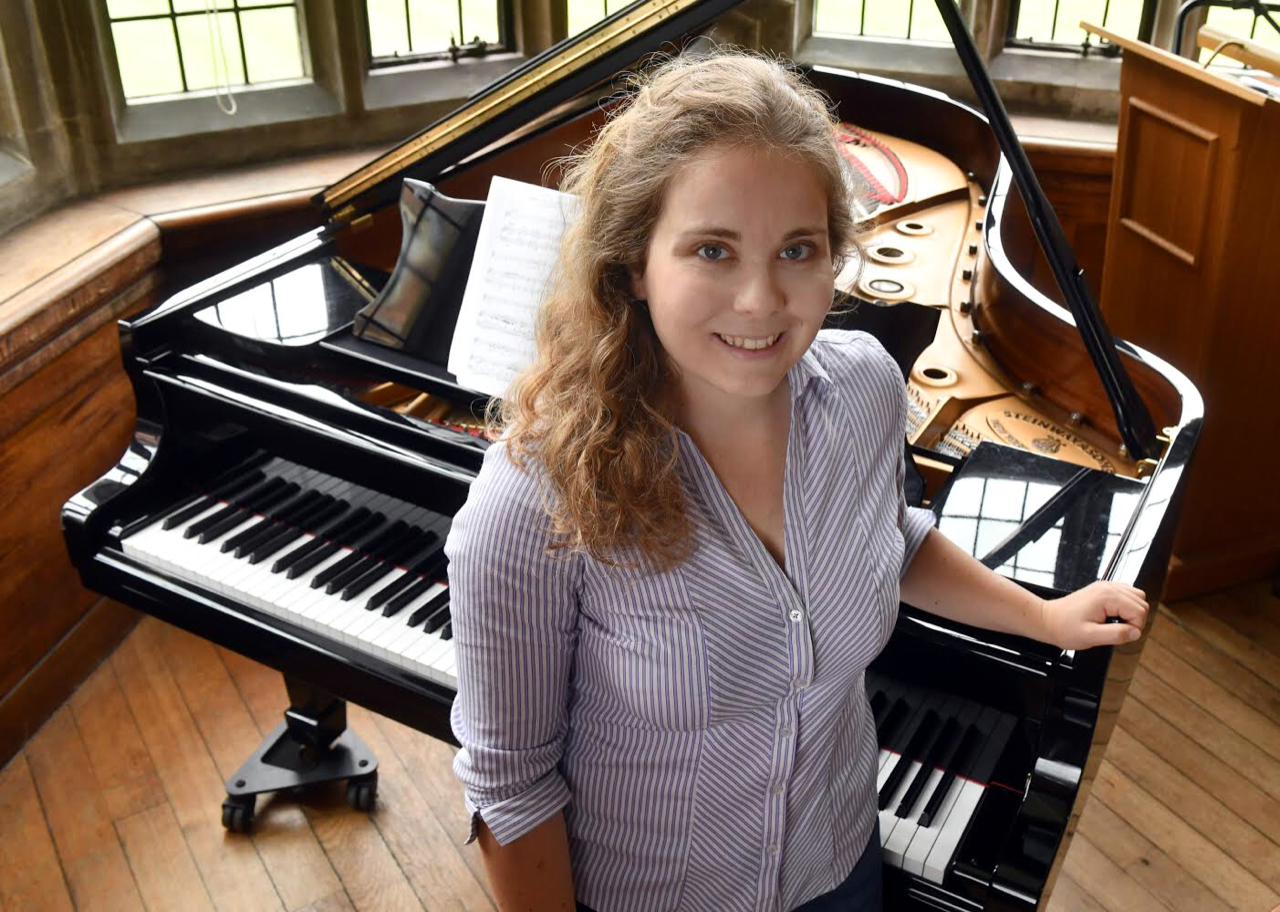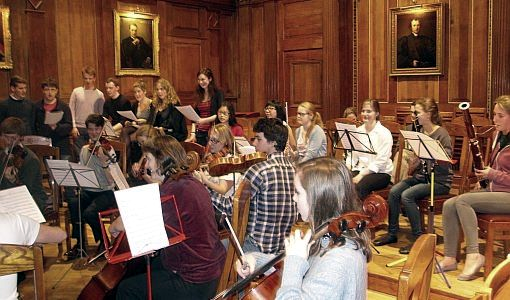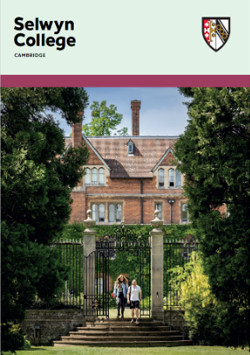We asked Dr Alan Howard, our Director of Studies, a few questions...
Can you tell us a bit about the Music degree?
Cambridge's BA in Music is designed to introduce you not just to a range of music, but to a wide variety of ways of thinking about and understanding it. Many students arrive as committed and experienced performers in varying contexts, and some may be composers; these are identities shared in one way or another by all of the lecturers and supervisors on the course. But what unites everyone in the Cambridge musical community is a passionate commitment to the pursuit of knowledge in all areas of musical study: to understanding how music works, how it interacts with all kinds of cultural phenomena in the modern world, and how the stories we tell about different kinds of music have been shaped throughout history by factors as diverse as politics and economics, technology and media, colonialism and racial identity, scientific inquiry, gender and sexuality, patronage, commercialism and globalisation.
In the first year of the degree, the focus is on giving you a solid grounding in the techniques and history of the Western musical tradition, as well as an understanding of the many roles music plays in today’s world. This year is designed to allow those from all backgrounds to gain the core skills needed for university-level music studies.
As you progress through your studies, you have increasing freedom to take specialised courses in different kinds of music, and approaches to studying it. You may also choose to follow a particular pathway through the degree, be that in performance, composition, music history, ethnomusicology, popular music, or music and science.

What is Selwyn's musical community like?
We are lucky enough to have three fellows in Music, with a broad range of interests and expertise. Alan Howard is the Director of Studies; a Selwyn graduate, he is particularly interested in seventeenth- and eighteenth-century English Music and editing and performing early music. Katharine Ellis is the University's 1684 Professor of Music; she is a cultural historian of music in France during the nineteenth and twentieth centuries. Sarah MacDonald, Director of Music in Chapel, is a widely acclaimed choral director, organist and composer; she is also director of Ely Cathedral Girls' Choir.
At any one time Selwyn usually expects to have 10–12 music undergraduates in residence, and several postgraduates. The musical community also encompasses the members of the Chapel Choir, many of whom study other subjects, and the active College Music Society, which organises weekly concerts featuring students and visiting guest artists.
How are Selwyn and the Faculty related?
Like other Cambridge degrees, teaching in Music is organised around lectures and seminars at the Faculty and supervisions (small-group or even one-on-one teaching) organised by the College. Students are supervised by College fellows and by academics at different Colleges who supply expertise in other areas. Selwyn is the closest of all the Colleges to the Faculty of Music, in West Road, and has one of the larger cohorts of Music students. Our students frequently top the results tables for Music in all years of study.

by the music society
Why is Selwyn a good place to study Music?
Your choice of college is mainly about the place where you will live and the community around you, as the academic offering is much the same whichever college you are at. Selwyn is a terrific place to be a student as it is a very friendly college, with excellent amenities, supportive staff, and a lively student body. Our active musical community makes it an excellent place to study for a music degree, and we are also blessed with superb facilities: all music students have the use of a piano in their rooms, there are two dedicated practice rooms and there is a Steinway grand piano in the College hall; the fine Létourneau organ in the chapel can also be used by experienced organists with the permission of the Director of Music. All music students receive financial support towards the provision of instrumental/vocal lessons, and there are many performance opportunities both in College and the wider University.
The subject at Selwyn
College teaching, in the form of supervisions and seminars, complements that provided by the Faculty. Our aim at Selwyn is to ensure that supervisions are tailor-made to the subject being studied and to the undergraduate studying it, flexible in organisation and adapted to suit individual needs.
Music at Selwyn enjoys a high reputation, both locally and nationally. There is always a large number of undergraduates reading Music at Selwyn. Among the many distinguished musicians who have graduated from Selwyn are Sir David Lumsden (formerly Principal of the Royal Academy of Music), Professor Gerald Hendrie (formerly Professor of Music at the Open University), and Dr Richard Marlow (formerly Director of Music at Trinity College, Cambridge).
The College is ideally situated for Musicians, being literally next door to the Music Faculty. There is much music-making within the College, and Selwyn musicians are conspicuous also for the prominent part they play in the musical life of the University at large. Many players in university orchestras are Selwyn undergraduates, for example, and the College has provided several of the elected officers of the main university music societies.
The College Library holds over 40,000 books. This includes a large music section where you will find books and scores that are of central importance in the Music Tripos, as well as many others of a more specialised nature; the Library’s holdings in Music are continually updated. The Library also provides a pleasant study area.
The Fellows in Music
The Director of Studies in Music at Selwyn, Dr Alan Howard, is himself a Selwyn graduate and received his PhD from King’s College London; he has also held academic posts at the University of Manchester and UEA, Norwich. He has lectured and taught at all four institutions, and additionally at Royal Holloway, University of London. Dr Howard has particular research interests in English music of the seventeenth and eighteenth centuries, with emphasis on analytical approaches and editorial practice.
The current 1684 Professor of Music in the Faculty, Katharine Ellis, is also a fellow of Selwyn. Professor Ellis is a cultural historian of music in France during the nineteenth and early twentieth centuries, and her research involves music ranging from medieval plainchant to Stravinsky.
Our Director of Music in Chapel, another fellow, is the distinguished choral director Sarah MacDonald, who is also Director of Ely Cathedral Girls' Choir.
Subject requirements
A-level/IB Higher Level Music or an equivalent is essential for Music applicants. ABRSM Grade 8 Theory at Merit or above can be accepted as a substitute, usually in combination with three A-Levels (or equivalent) including at least one in an arts or humanities subject. Beyond this there are no required subjects: humanities, languages and sciences are all good choices. Although it is not essential, sixth-formers are encouraged to take the Grade 8 Theory alongside their A-Levels.
Interviews
The subject interview is held with the Director of Studies and a colleague from the Music Department. The purpose of the subject interview is to assess potential. On the basis of their present state of musical knowledge and technical skill, we try to see how far candidates can be stretched: can they be led to new insights, can they suggest ways of tackling problems, are they receptive and responsive to teaching?
Part of the interview will also consist of discussions about a piece of music and a passage of text, both of which you will have prepared before the interview. Applicants will also be asked to send in samples of school work.
Applicants also have a general interview of 10-15 minutes. This is designed to learn about the candidate's interests and activities, motivation in choosing to study Music at Cambridge, and maturity of approach towards academic work.
Admissions assessment - no pre-registration required
Before the interview you will be asked to sit a short written paper comprising a single question: the harmonisation of a melody. This will be discussed during the interview, and the discussion will be at least as important as the answer itself. You do not need to register in advance and details will be provided with interview information.
Awards and Prizes
In addition to academic awards (made on the basis of Tripos results), Selwyn also offers the following entrance awards, for all of which there is no restriction of subject: an Organ Scholarship twice in every three years; about five Choral Exhibitions every year (in all voices); and, on average, one or two Instrumental Awards every year. The results achieved by Selwyn Musicians in recent years have been exceptionally good, with several 1sts and starred 1sts. Such results automatically attract College prizes; in addition Selwyn Musicians have won University prizes for the most outstanding result in their year.
Three prizes are awarded annually to distinguished performers: the Williamson Prize for Musical Performance; the Edith Ray Singing Prize; and the George Roe Prize for outstanding performance at a Music Society concert.
Pianos and Practice Facilities
All undergraduates reading Music and both Organ Scholars are provided with a good upright piano (free of charge) in their College room for all three years. Selwyn Musicians probably do most of their music practice in their College room, but other facilities can be used as well. The Music Rooms are available throughout the day and during much of the night, and are available to all members of the College for private practice, lessons, and chamber music rehearsals. The Hall can be used for practice, rehearsals, and concerts outside mealtimes; it contains a beautiful Steinway grand piano and a harpsichord; the acoustics in Hall are outstandingly good.
Subsidy for Instrumental and Singing Lessons
The College has been generously endowed with a Music Fund; among its uses is the provision of a subsidy towards the cost of instrumental and singing lessons for all undergraduates reading Music, and for all undergraduates holding a Music award (organ, choral, instrumental).
March 2025


